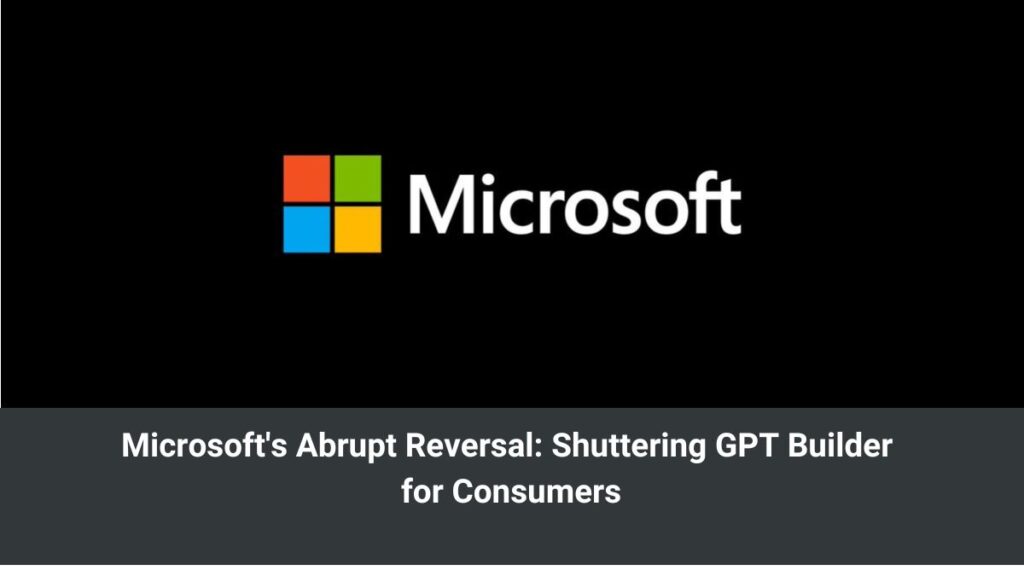A Promising Tool, A Fleeting Opportunity
In a move that has left many tech enthusiasts bewildered, Microsoft has announced its decision to retire GPT Builder, a tool within its Copilot Pro offering for consumers, just three months after its broad availability. This unexpected reversal comes as a surprise, given the initial excitement surrounding the tool’s potential to empower users with the ability to build and configure customized GPTs (Generative Pre-trained Transformers) for specialized use cases.
The Rise and Fall of GPT Builder
Back in March, Microsoft embarked on a bold journey, rolling out GPT Builder in Copilot Pro for consumers on a broad scale. This innovative tool promised to unlock a world of possibilities, enabling users to harness the power of artificial intelligence (AI) to create and fine-tune GPTs tailored to their unique needs.
However, the euphoria was short-lived as Microsoft recently revealed its plan to retire GPT Builder for consumers on July 10, a mere three months after its widespread launch. This abrupt decision has left many users scratching their heads, questioning the rationale behind such a swift reversal.
Reasons Shrouded in Mystery
While Microsoft’s announcement provided little insight into the specific reasons for this move, the company cited an ongoing “evaluation” of its strategy regarding Copilot extensibility in consumer use cases. According to a support document released by the tech giant, it has concluded that GPT Builder for consumers is not a viable offering, at least for the time being.
This decision has sparked speculation within the tech community, with some suggesting that the tool may have fallen short of user adoption targets or failed to meet the company’s expectations in terms of commercial viability.
Prioritizing Enterprise and Commercial Interests
Despite the retirement of GPT Builder for consumers, Microsoft has reaffirmed its commitment to enterprise and commercial support for the underlying technology. This stance aligns with the company’s broader strategy of focusing on revenue-generating initiatives and catering to the needs of its corporate clients.
According to industry analysts, this move may reflect Microsoft’s recognition that the true potential of AI and GPT technologies lies within the enterprise sector, where customized solutions and specialized applications hold immense value for businesses across various industries.
A Bittersweet Reality for Consumers
For consumers who had embraced the promise of GPT Builder, the news of its retirement is undoubtedly a disappointment. Many had envisioned a future where they could harness the power of AI to enhance their personal and professional endeavors, leveraging customized GPTs to streamline tasks, optimize workflows, and unlock new realms of creativity.
Microsoft’s decision means that consumers will no longer have access to the GPTs they created through the tool, and all associated data will be deleted by July 14. While the company has provided instructions for saving GPT instructions for reference, the loss of these customized models represents a setback for those who had invested time and effort into their development.
Personal Reflections and Anecdotes
As someone fascinated by the rapid advancements in AI and its potential to revolutionize various aspects of our lives, I couldn’t help but feel a tinge of disappointment upon learning about Microsoft’s decision. The prospect of empowering consumers with the ability to create their own customized AI models held immense promise, opening up a world of possibilities for individuals to explore and innovate.
I vividly remember the excitement I felt when GPT Builder was first announced, envisioning the countless applications and use cases that could emerge from such a tool. From personal assistants tailored to individual preferences to creative endeavors fueled by AI-generated content, the potential seemed limitless.
A Call for Perseverance and Adaptation
While Microsoft’s decision to retire GPT Builder for consumers may be disheartening for some, it serves as a reminder that the journey towards embracing and integrating new technologies is rarely a linear path. Setbacks and course corrections are inevitable as companies navigate the ever-evolving landscape of innovation and consumer demand.
However, rather than dwelling on the disappointment, we must embrace a mindset of perseverance and adaptation. As AI continues to make rapid strides, new opportunities and tools will undoubtedly emerge, presenting fresh avenues for consumers to harness the power of this transformative technology.
It is imperative that we remain open-minded and adaptable, recognizing that the path to progress is paved with both successes and failures. By embracing a spirit of resilience and a willingness to learn from setbacks, we can position ourselves to seize the next wave of innovation and unlock the full potential of AI for personal and societal advancement.
In the words of the renowned futurist and author, Ray Kurzweil, “We are entering a era of exponentially accelerating technological progress. Our models of the future have to take into account the exponential nature of technological change.” Let us heed these wise words and remain steadfast in our pursuit of innovation, for it is through perseverance and adaptability that we will unlock the boundless possibilities that lie ahead.

